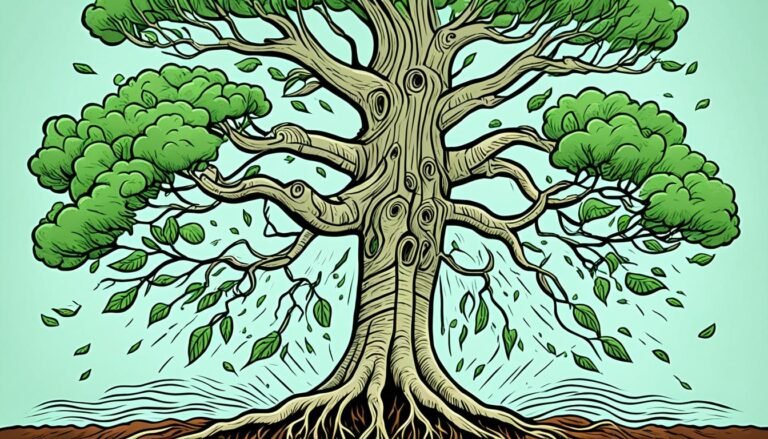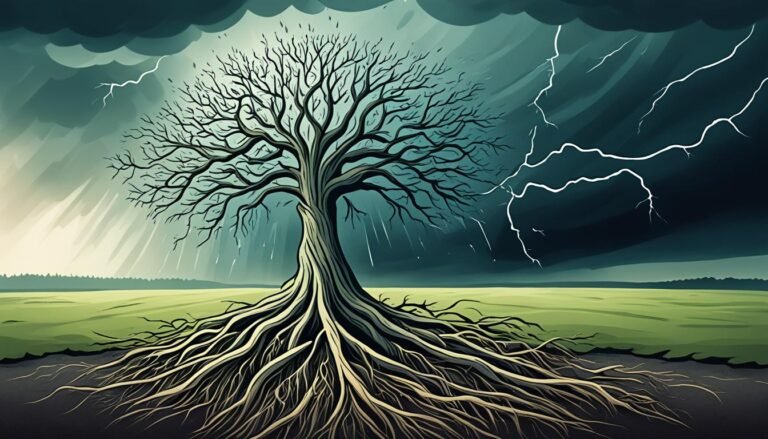Forgiveness and Healing: Liberating the Heart from Resentment and Grudges
“Forgiveness is not an occasional act; it is a constant attitude.” – Martin Luther King Jr.
Forgiving and healing are important steps that can change our lives. They help us let go of hurt and resentment. This allows us to find peace within, bounce back from tough times, and make true peace with others.
When we don’t forgive, we keep the past’s heavy weight. This stops us from enjoying the now and looking forward to what’s next. Forgiveness opens a door to freedom. It helps us let go of old pains and start anew.
Forgiveness is a trip to self-understanding and fresh starts. It taps into our kind nature, making us forgive others, and ourselves too. Forgiveness lets us move on from our hurt. We come out of it stronger, ready to face what life brings.
Key Takeaways:
- Forgiveness and healing have the power to liberate the heart from resentment and grudges.
- Practicing forgiveness contributes to inner peace, emotional resilience, and genuine reconciliation.
- Letting go of resentment and embracing forgiveness is a key step in the healing journey.
- Cultivating self-compassion is essential in the forgiveness process, both for oneself and others.
- Forgiveness is not a one-time act but a continuous attitude that can bring about lasting transformation.
The Transformative Power of Forgiveness and Healing
Forgiveness and healing have a big impact on us. They help us grow and heal, especially after tough times. These steps are vital for our well-being and recovery.
Facing past hurts by forgiving and healing can lead us to a better future. They allow us to see our pain, deal with our feelings, and let go of anger. Forgiveness helps us move past trauma, giving us a new start.
Understanding and being kind to ourselves is key on this path. We must accept our own pain and let ourselves heal. This self-love and understanding makes our healing journey smoother.
“Forgiveness is not always easy. At times, it feels more painful than the wound we suffered, to forgive the one that inflicted it. And yet, there is no peace without forgiveness.” – Marianne Williamson
Healing takes time, patience, and looking within. It needs our ongoing care and kindness. Forgiveness and healing are steps to let go of past sorrows and finding ourselves again.
The Role of Self-Compassion in Trauma Recovery
Self-compassion is crucial for recovering from trauma. It lets us care for our hurting selves gently. This is how we start to heal, making a safe space for recovery.
Being nice to ourselves, staying mindful, and changing how we talk to ourselves are ways of practicing self-compassion. It means treating ourselves with the same care we would for a friend. Doing this naturally helps our healing.
Forgiveness and healing can truly change us, no matter our journey. By showing ourselves kindness and forgiving, we move towards healing. This process frees us from the past, creating a future full of peace, strength, and self-discovery.
Cultivating Inner Peace through Forgiveness
Forgiveness can bring deep calm to our lives. It lets us let go of anger and resentment. Through it, we find a new sense of freedom and peace. This path to forgiveness is better understood with regular practice. It gets easier with the help of mindfulness.
To forgive is to choose to stop holding onto past pain. It means knowing what happened and letting go of the hurt. By forgiving, we stop focusing only on our past. We start to live more in the present, with kindness and an open heart.
Mindfulness is key to learning how to forgive. It’s about really paying attention to now, without judgment. This practice helps us see our own and other people’s pain. It boosts our care and understanding for others.
Adding mindfulness to our forgiveness journey helps us know ourselves better. We learn to see when we’re feeling angry or holding a grudge. Then, we can act with kindness and awareness. Mindfulness also teaches us to be patient and strong. This is important as we face the difficulties of forgiveness.
Loving-kindness meditation is a great way to work on forgiveness. In this practice, we send love to both ourselves and those who hurt us. It opens up our hearts for healing and forgiveness. This practice is a powerful step toward both.
“The practice of forgiveness is our most important contribution to the healing of the world.”
—Marianne Williamson
Body scan meditation is another useful tool. It involves focusing on each part of your body, from head to toe. This helps us notice and let go of physical and emotional pain. By doing this gently, we can work on forgiving others and ourselves.
Forgiving each day can change our inner world a lot. It opens the door to healing and inner growth. We become free from the grip of past troubles. This brings us fresh joy, clarity, and a healthy heart.
Forgiveness and mindfulness together lead us to deep peace. They are a powerful way to change our lives. This path makes true and lasting inner peace possible.
Building Emotional Resilience through Forgiveness
Forgiveness is powerful. It frees our heart from anger and lets us build resilience. When we forgive, we choose to heal and grow, moving ahead with courage.
Self-compassion is a key in forgiveness. It’s about being kind to ourselves. This kindness is healing. It helps us handle hard times without judgement.
Self-compassion helps us get through tough times. It protects us, keeping us from being overwhelmed. This way, we can forgive not just others, but also ourselves.
“Self-compassion is not about self-indulgence or self-pity, but rather a gentle embrace of our own humanity. It is the willingness to be present with our pain and extend kindness, just as we would to a dear friend.”
Adding self-compassion to forgiveness helps us deal with our feelings. It makes us think, understand, and heal emotionally. This leads to well-being.
Forgiveness strengthens us to face life’s tests. It helps us grow, recover, and flourish. With forgiveness, we’re ready to tackle anything with grace and power.
Emotional resilience grows with time. Forgiveness helps it grow. With self-compassion and forgiveness, we become emotionally strong. We can handle all of life’s challenges.
The Path to Genuine Reconciliation
Reconciliation is a deep process that heals and restores. It goes beyond just saying you’re sorry. It focuses on rebuilding trust and understanding. To truly reconcile, forgiveness and healing are key.
Forgiveness and healing pave the way for reconciliation. When people forgive and let go of hurt, they allow for reconciliation to begin. This opens the door for hearts to heal.
Yet, forgiveness on its own is often not enough. This is where restorative justice steps in. It aims to repair the harm done by an offense. Restorative justice champions accountability, talks, and the renewal of trust.
It sets the stage for victims, offenders, and the community to talk openly. Everyone has a voice, which builds empathy and heals. This type of justice lets everyone talk, understand, and move towards peace, leading to true reconciliation.
Restorative justice isn’t just about the offender. It’s about making things right and rebuilding. It helps in healing and growing, both personally and as a community.
Forgiveness, healing, and restorative justice form a powerful trio for reconciliation. It takes time, understanding, and a commitment to seeing other viewpoints. This journey leads to true peace.
By living out reconciliation’s principles, communities can leave behind old conflicts. They can create a future based on kindness, understanding, and coming together.
The Role of Self-Compassion in Forgiveness
Forgiveness is about freeing ourselves from the pain of holding grudges. It means showing understanding to others, but also to yourself.
Self-compassion is key in forgiving. It helps us be kind to ourselves. This kindness lets us be understanding and forgiving towards others too.
Self-compassion allows us to deal with pain in a positive way. It stops us from getting stuck in anger. By working through our own issues, we grow stronger.
“Self-compassion is not a sign of weakness; it is an act of courage and strength. It takes immense bravery to confront our own pain and choose forgiveness over resentment.”
Self-compassion changes how we see ourselves and others. We learn that everyone can mess up and feel pain. With this, we can let go of hard feelings, which opens the door to healing.
Fostering Self-Compassion in the Forgiveness Process
Building self-compassion takes time. Here are some ways to do it while on a path to forgiveness:
- Do things that make you feel good, like writing or being creative.
- Stop the negative thoughts and be kind to yourself instead.
- Turn to friends, family, or professionals for support and advice.
- Forgive yourself for your own mistakes, and use them to grow.
“Remember, forgiveness is not about condoning the actions of others. It’s about freeing yourself from the emotional shackles of anger and resentment, and embracing self-compassion as a catalyst for healing and growth.”
Letting Go: A Key Step in the Healing Journey
One key step to healing is letting go. This step is important for forgiveness and healing. It lets individuals release the burdens from their hearts. By letting go of past hurts, true healing begins. This process helps us to leave negativity behind and look to a brighter future.
Letting go is not about forgetting or accepting what happened. It’s a choice to let go of anger and resentment. It’s an act of kindness to yourself, putting emotional health first.
“Letting go doesn’t mean that you don’t care anymore. It’s realizing that the only person you really have control over is yourself.”
– Deborah Reber
When we let go, we make room for forgiveness and healing. It brings emotional strength and inner peace. Letting go changes our lives, breaking the cycle of pain. We can then look forward to a hopeful future.
The Benefits of Letting Go:
- Emotional Resilience: Letting go helps us build emotional strength. It frees us from past hurts. This allows us to handle hard times well and think positively.
- Healing and Transformation: Letting go of resentment is a chance to heal and change. It opens us to new chances and growth. We find peace in this new journey.
- Inner Peace: Letting go leads to peace inside and in our relationships. It’s a path to understand and be kind to yourself. This leads to feeling calm and happy.
It’s tough to let go, but it’s a key part of healing. It needs time, thinking, and a will to move on. This change brings deep healing and freedom. It makes our lives richer and happier, step by step.
Spiritual Growth through Forgiveness
Finding the strength to forgive is powerful. It helps heal our hearts and leads to spiritual growth. When we forgive, we start on a path to deep spiritual understanding. This lets us connect more with ourselves and those around us. Forgiveness takes us beyond our ego’s limits. It brings us peace inside and broadens our minds.
Being mindful is important for forgiving and growing spiritually. Mindfulness means watching our thoughts and feelings with kindness, not criticism. By doing this, we can understand and let go of hurt. This helps us move past resentment towards forgiveness.
Forgiving isn’t just about the end result; it’s a whole journey by itself. It might be hard sometimes, but that’s when we grow the most. Seeing forgiveness as part of our spiritual life helps us love more and be kinder.
“True forgiveness is not just about letting go of the past; it is about opening our hearts to the present moment and embracing the beauty of life.”
Forgiveness sets us free from anger and hurt. It makes room for us to heal and change. Letting go of guilt and blame lifts us up. We can feel lighter and happier.
The Power of Forgiveness and Gratitude
Forgiveness and thanks go hand in hand in spiritual growth. Giving thanks helps us see what’s good in our lives. When we add forgiveness, our hearts open. This leads to amazing spiritual moments.
- Start each day by expressing gratitude for the blessings in your life, no matter how small.
- Practice self-forgiveness by recognizing and letting go of self-judgment and criticism.
- Challenge negative thoughts and replace them with positive affirmations of forgiveness and healing.
- Extend forgiveness to others by cultivating empathy and understanding their perspective.
- Engage in mindfulness practices like meditation, breathwork, or journaling to deepen your connection with your spiritual self.
Forgiveness is a journey that never ends. It’s something we do every day. It’s the key to growing spiritually. With each step towards forgiving, we get closer to our true selves. We find deep joy and peace as we heal from the past.
Cultivating Mindfulness Practices for Forgiveness
Forgiveness changes us, bringing us peace and healing inside. Adding mindfulness to our daily life can help a lot. It makes us more aware of our thoughts, emotions, and how our body feels. We learn to see these things clearly, without adding any judgment.
A great way to start with forgiveness is through body scan meditation. You focus on each part of your body, feeling for any tightness or discomfort. This makes you notice what areas need forgiveness.
Loving-kindness meditation is also helpful. You send kind thoughts to yourself and others. This warms your heart and makes forgiveness easier, bringing peace within.
Writing your feelings in a journal is another mindfulness tool. It makes you think about past hurts and understand your emotions better. This helps let go of hard feelings, aiding in the forgiveness process.
“When you forgive, you free yourself from the bonds of resentment and open the doors to inner peace.” – Jack Kornfield
Breathing exercises and walking mindfully also support the forgiveness journey. They help you be in the moment and feel calm. This moves you away from pain towards forgiving others.
Finding Peace within Forgiveness
Using daily mindfulness helps you know yourself better and deal with tough emotions. It teaches you to drop the bad thought habits that block forgiveness. You learn to stop holding grudges, and reach out with understanding instead.
Finding forgiveness through mindfulness takes work and patience. And remember, forgiving yourself is key. This lets you understand others better and be kind to them.
Forgiveness isn’t about forgetting or saying things are okay. It’s about letting go of your pain. Use mindfulness to guide your way to real peace in your heart and mind.
Embracing Restorative Justice in the Healing Process
Restorative justice is a way to solve conflicts that aims to fix harm and rebuild connections. It involves everyone in healing and looks at why conflicts happen, not just who is to blame. People are asked to help heal and take responsibility for what they did.
It’s closely linked to forgiveness and healing. It helps make places where people can forgive, make up, and truly heal.
Restorative justice uses talking to sort out problems. Through these talks, everyone gets to share how they feel and understand each other’s views. This understanding helps people make peace and heal.
Restorative justice practices empower individuals to actively work towards forgiveness and healing, allowing for the resolution of conflicts in a holistic and sustainable way.
It puts fixing harm at its center, rather than just punishing. It wants to mend relationships and end bad feelings. This means accepting the pain, helping everyone heal, and caring about what others feel. This can lead the way to forgive.
It’s good for both people and where they live. It asks everyone to join in fixing things. By being caring and understanding, whole places can get better and live more peacefully.
The Role of Restorative Justice in Reconciliation
Giving peace a chance is big in healing. It means saying sorry for past wrongs, fixing the real issues, and getting trust back. Restorative justice is key here. It makes space where talking, understanding, and getting better can happen.
Doing the right thing helps wrongdoers see the harm they did. Talking helps them learn and say sorry. This can fix broken ties and make real peace possible.
It also makes communities more responsible. By all facing the truth and trying to fix things, there’s less harm and more fairness. This can make society a better, fairer place for all.
Taking up restorative justice can really solve big problems. By truly working on forgiveness, healing, and fixing things, people and places can change for the better, full of caring and peace.
Conclusion
We’ve delved into how forgiveness and healing can change lives by freeing us from bitterness. These steps help us find peace, become emotionally stronger, and make real amends.
Forgiveness is good for us too. It lets us leave behind old pain and make room for peace and freedom inside. It’s not just about helping others.
Reaching forgiveness needs us to be kind to ourselves. Mindfulness and being ready to forget past wrongs are key. These steps build emotional strength, helping us recover from tough times and forgive.
Restorative justice is important in our path to forgiveness. It creates a space for healing, trust, and forgiveness to grow.
Forgiveness and healing are hard but crucial. They help us grow, and they mend our bonds with others. They also help heal our shared communities. So, by taking these steps, we find peace inside and have the strength to make up for past mistakes.








